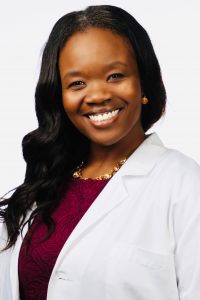
Dr. Shakira J. Grant is an Assistant Professor in the Divisions of Hematology and Geriatric Medicine, and a board-certified Geriatric-Hematologist-Oncologist providing care for older adults with hematological malignancies.
What brought you to UNC Medical Center?
UNC Medical Center felt like home the very first time I visited the campus. The ease of conversation with those around me, the welcoming smiles, and the collegial atmosphere spoke to an institutional culture that was not only steeped in academic excellence, but one where building personal relationships and fostering a supportive environment was equally important.
Professionally, the opportunity to work with and be mentored by Drs. Hyman Muss and Jan Busby-Whitehead, recognized leaders in Geriatric Oncology and Geriatrics, respectively, further cemented my decision to come to UNC. I knew of their outstanding academic achievements, their passion and dedication for caring for older adults, and knew that my personal goals and commitment to advancing the field of Geriatric Hematology-Oncology were well aligned with their individual goals and those of the institution.
Where are you from?
I was born in the beautiful Caribbean island of Barbados where I spent the majority of my adult life.
Did you always want to be a doctor?
Yes. At the age of 10, just before entering secondary school (the equivalent of middle and high school in the US), I decided to become a doctor. Growing up, I did not have physicians in my family. Nevertheless, I found myself drawn to the sciences. While I found science fascinating, I also loved interacting with people. From my early days in scouting as a Brownie and then a Girl Guide, I was drawn to the activities that allowed me to participate in local outreach, such as volunteering in community nursing homes and on the pediatric and oncology wards in Barbados’ single tertiary hospital. I was comfortable in these settings. I saw how challenging the field of medicine could be, yet I knew this was the career for me. Several years later, I graduated from medical school, becoming a first-generation university graduate and the first medical doctor in my family.
How did you choose your specialty?
I think the specialty chose me. I knew just around the age of 11 or 12 that I would become an oncologist. It was around that time that my maternal grandfather was diagnosed with lung cancer. Discussions among the adults always involved chemotherapy and its side effects, whether it was possible to survive a lung cancer diagnosis and planning for the next steps in cancer treatment. Though it was terrifying to think of losing a loved one to cancer, my curiosity about oncology as a specialty was further peaked. I saw firsthand the toll cancer and its treatments had on my grandfather and our family. I also witnessed how his quality-of-life seemed to worsen with each passing day. As I advanced in my medical career, it became evident that cancer’s consequences extended well beyond the disease. Especially for older patients with cancer, there is so much more to untangle, including psychosocial, nutritional, and other problems related to competing medical comorbidities. Welcoming these challenges, I chose to pursue a career in Geriatric Hematology-Oncology.
What do you find most rewarding about your work?
The patients I get to meet. I view each patient encounter as an opportunity to focus not only on their cancer but to learn about the things that matter most to them. Each person’s story is unique, and sharing in their journey is an absolute privilege.
What are some of the new developments in your field of specialty?
The field of Geriatric Hematology-Oncology is still considered to be a relatively new specialty. Recently, we have seen tremendous growth in the number of health care providers interested in developing Geriatric Oncology care programs within their institutions and the number of researchers developing careers at the intersection of cancer and aging. It has been exciting to watch this transformation. Looking back to 2015, when I was a Geriatric Medicine fellow, I see how much has changed in the field, especially with the greater use of geriatric assessments to inform medical decision making for older adults with cancer. Now clinical trials are examining fitness-based approaches for the assignment of cancer therapies based on geriatric assessments. This approach is a significant step toward helping clinical providers understand how fitness level impacts cancer-related outcomes and how a patient’s fitness may change over time in response to therapy. Furthermore, using fitness-based approaches to assign therapy will help broaden clinical trial eligibility criteria beyond chronologic age for older adults with cancer.
Is there a particular achievement (professional or personal) that has been most gratifying to you?
It is not easy to point to one specific achievement. Overall, having this opportunity to pursue a career in a field that I love and in such a wonderful and supportive environment at UNC ranks among my most gratifying experiences to date.
What is the best advice you have ever received?
My best advice came from one of my mentors: “I am enough.”
If you weren’t a physician, what would you like to be doing?
I have often joked about this with my husband, friends, and family. I love organizing and interacting with people. I would be an event planner!
What hobbies do you enjoy?
I love boxing and kickboxing. I also enjoy traveling, hiking, and spending time outdoors.
Do you have a favorite quote or life motto?
“No matter what gets done and how much is left undone, I am enough. It’s going to bed at night thinking, Yes, I am imperfect and vulnerable and sometimes afraid, but that doesn’t change the truth that I am also brave and worthy of love and belonging.—Professor Brene Brown.”
What was the last book you read?
The last book I read was Becoming by Michelle Obama.